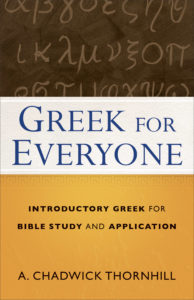What books should a recent seminary graduate add to their library?
I’ve had a candidate for ministry who’ll soon be graduating ask for book recommendations. I offer the following. It’s not a list of everything a pastor should have in his library, but some suggestions of directions to strike out in when you get past having required reading for classes.
A few thoughts before the books:
- Building a library and reading are different things. Don’t feel like you have to read everything, you’re not displaying a collection of things you’ve read, you’re collecting tools to have ready. Having texts on hand is invaluable to quickly check something, scan to see if you’d recommend it to a church member, or dig in if the whim strikes you. You can’t read something if you don’t have it. Also, stacks of unread books are a good way to remember how much you don’t know.
- One of the the benefits to classes is having someone lead you to resources you might not find otherwise. Looking online for recommended lists, checking the footnotes of favorite authors, and continuing to look for recommendations is a great way to find resources. Amazon recommendations are going to recommend things a lot like what you already have purchased or like – this isn’t helpful to broaden your reading.
Now for some recommendations. Assuming one has basic texts from seminary classes I would work on adding these to my shelves:
Bible:
- Beale, G.K, A New Testament Biblical Theology
- Bauckham, Richard, Jesus and the Eyewitnesses
Theology
- Ames, William, The Marrow of Theology
- Oden, Thomas, Classic Christianity: a Systematic Theology
- Watson, Thomas, A Body of Divinity
- -, The Ten Commandments
- -, The Lord’s Prayer
also, working through Sherman Isbell’s Course in Readings in Reformed Systematic Theology has been helpful. Slowly adding the sets from Owen, Warfield, and others will be a good investment. These can be found used or at good deals.
Commentaries
Overall, I found full sets of commentaries a bad investment, the quality in the series is too variable. I would suggest getting an inexpensive set just so you have the whole Bible covered then invest in commentaries as you preach. One of the benefits of preaching lectio continua is that as I begin preaching through a new book of the Bible I purchase several of the best available commentaries. Usually there is something recently published worth adding to classic, standards. Get the following two survey books and used them along with BestCommentaries.com to guide your purchases. I have found getting along with a good exegetical guide, working with a good technical commentary and a good pastoral/application commentary to be most helpful. I’ve also found it helpful to get commentaries from other perspectives and traditions: Eastern Orthodox, Jewish, Historical etc… Get recommended commentaries and use what you can but realize you might only be reaching for some when there’s a difficult interpretation and you need more scholars to weigh in.
- Longman, Tremper, Old Testament Commentary Survey
- Carson, Don, New Testament Commentary Survey
Preaching
- Perkins, William, The Art of Prophesying
- Chapman, John, Setting Hearts on Fire
- Millar, Gary and Phil Campbell, Saving Eutychus
Prayer
- Old, Hughes Oliphant, Leading in Prayer
- Henderson, Daniel, Old Paths New Power
- Carson, Don, Praying with Paul
Pastoring and Leadership
- Tripp, Paul, Dangerous Calling
- Marshall, Colin, The Trellis and the Vine
- Dever, Mark, The Deliberate Church
- Oden, Thomas, Pastoral Theology
- Thornton, Martin, The Heart of the Parish
- Peterson, Eugene, Under the Unpredictable Plant
- – , Working the Angles
- -, Five Smooth Stones
- -, The Contemplative Pastor
What recommendations would you add?
(Note: all links are affiliate links.)

